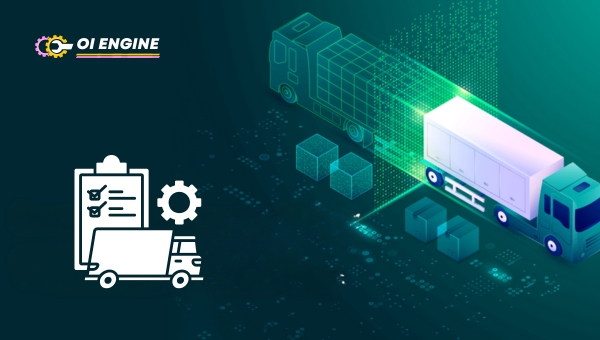If you’re deep in the logistics world like me, you know how vital having a top-notch trucking dispatch software system is to your operations.
A lot is riding on these platforms – customer satisfaction, cost-efficiency, and operational seamlessness.
But when it comes to choosing the best of the best for 2025, where do you start? Buckle up because you’re about to take an exciting ride into the future of trucking software systems.
The trendsetters for 2025 in the trucking dispatch software sector promise cutting-edge features tailored around advanced tracking capabilities, real-time monitoring, and streamlined communication measures.
These platforms such as TruckingOffice, ITS Dispatch, and ProTransport secure their spots at the top by providing excellent service delivery coupled with an easy-to-use interface that ensures your supply chain activities run like clockwork.
15 Best Trucking Dispatch Software of 2025
As the trucking industry continues to grow and evolve, having the best tools in place is vital. One such tool that has become invaluable in streamlining operations is trucking dispatch software.
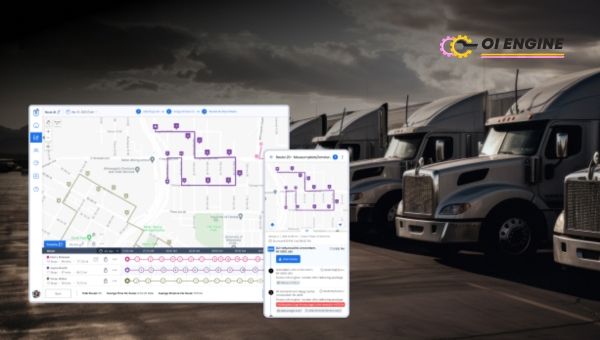
With countless options available, it’s challenging to select the right one for your needs. However, having evaluated numerous systems on the market today, I have narrowed my list down to what I believe will be the top contenders for 2025.
1. TruckingOffice
TruckingOffice is an all-in-one solution that can manage every aspect of your trucking business from dispatch to billing. What makes TruckingOffice unique is its user-friendly interface coupled with a wide array of functionalities.
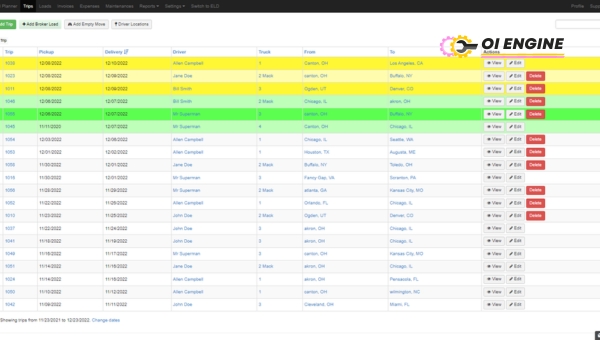
This software simplifies many aspects such as load planning, organizing driver settlements, and managing fuel tax reporting.
Pros:
- User-friendly platform making it easy for beginners.
- Comprehensive feature set that covers most operational needs.
- Fantastic customer support that easily resolves issues.
Cons:
- Having so many features might make it a bit overwhelming for some users.
- The monthly subscription cost might be a bit higher compared to other solutions out there.
- Some users noted intermittent technical issues occasionally
Also Read: Trailer Interchange Coverage-Protect Your Fleet!
2. ITS Dispatch
ITS Dispatch has earned its place due to its impressive versatility catering to both owner-operators and fleets alike.
Designed with small-to-mid-sized businesses in mind, this cloud-based software offers a plethora of features that include compliance management functions and robust reporting capabilities.
Pros:
- Cloud-based means you can access your operations anytime from any device
- Excellent compliance systems integrated into its design
- Comprehensive data-reporting capabilities mean better decision-making output
Cons:
- A few users reported fewer customization options than other similar platforms
- There seems to be a slight learning curve associated particularly with advanced features
- Compared to some competitors, users have reported occasionally slow performance
3. ProTransport
When it comes to functionality and excellent management solutions, I have found ProTransport to be one of the best dispatch software offerings in 2025.
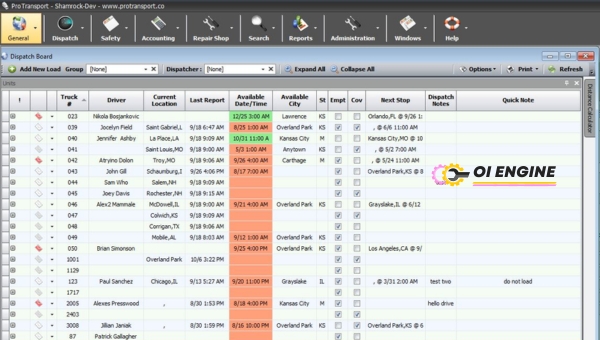
ProTransport is user-friendly and ensures all delivery tasks are executed in real time without any hassle or stress.
The features offered by this software make it a hit amongst many users like myself. For instance, it supports automatic route optimization which ensures drivers take the shortest route possible to make their deliveries thereby saving time and cost. There’s also a live tracking feature that allows for monitoring trucks on their delivery routes.
Pros
- User-friendly interface: Even those who aren’t tech-savvy can navigate with ease.
- Real-time delivery updates: This keeps you informed about your consignments at all times.
- Route Optimization: Ensures fuel economy and reduces unnecessary mileage.
Cons
- Learning curve: It might take some time to get used to all its features.
- Costly subscriptions: The pricing might be on the higher side for small businesses.
- Limited availability: It may not be available across all regions globally.
4. Rose Rocket
As an experienced user, I have found Rose Rocket dispatch software quite comprehensive yet simple to implement throughout various business sizes.
Its dashboard offers clear visuals about job status, driver assignments, location tracking, and more – information critical for tracking daily operations.
One standout feature of Rose Rocket is its capability to streamline communication between carriers and brokers thus enhancing workflow management significantly.
It has built-in tools that ensure swift billing processing including invoice generation along with payment acknowledgments.
Pros
- Streamlined communication: Enhances workflow productivity.
- Comprehensive dashboard: View all information at a glance.
- Speedy billing processing: No delays in invoice creation or recording payments.
Cons
- Lack of scalability: It might not be the best choice for rapidly growing businesses.
- Training required: Initial user training might be necessary to fully understand its functions.
- Customization limitations: Some users might find the customization options not as extensive.
Also Read: Top 26 Load Boards In 2024
5. Axon Trucking Software
Axon is a pioneering name when it comes to state-of-the-art dispatch software for the trucking industry. With an impressive range of features, Axon prides itself on offering comprehensive solutions that adapt to complex operations.
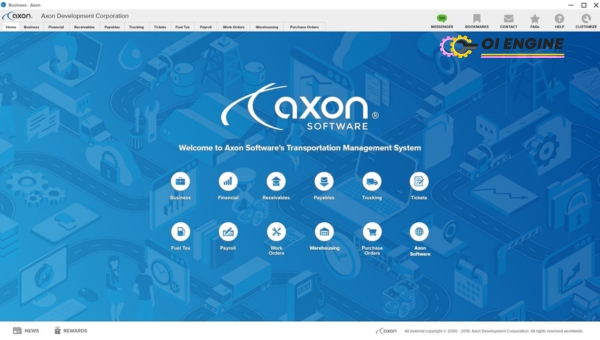
Their solution provides seamless integration across all different departments – from dispatch to accounting – ensuring smoother workflows and hence fewer hiccups in everyday operations. Real-time updates permit teams to stay informed, paving the way for well-coordinated activities.
Particularly remarkable is their multi-currency feature that allows businesses with international transactions to save significant time otherwise spent in conversions manually.
Moreover, Axon serves overnight reports that help plan effectively, painting a clear picture for decision-making.
Pros:
- Real-time updates ensure timely coordinated actions.
- The multi-currency feature simplifies international transactions.
- Overnight reports assist in strategic planning and better decision-making.
Cons:
- Costs can be steep for small-scale companies; it seems more suited for medium-to-large-scale enterprises.
- Its wide array of features may have a learning curve for new users.
- Entry or modification errors can cause miscommunications across integrated departments.
7. Motive
Motive Trucking Dispatch Software offers one of the leading options available in today’s market with its attractive user-friendly interface and customer-oriented approach.
Equipped with dynamic dispatch management technology, Motive offers multiple tracking mechanisms relaying real-time information on load status, driver availability, and dispatch assignments. This means there’s less downtime and more productivity.
What strikes me most about Motive’s service is its empathic approach towards drivers. The software includes features such as mobile compatibility for easy accessibility and fatigue recognition mechanisms to ensure driver wellness and safety.
Pros:
- Real-time tracking boosts efficiency by reducing the potential for error.
- Mobile compatibility allows easy access for drivers on the road.
- Sensitive towards driver health with their unique fatigue recognition mechanism.
Cons:
- There might be a need for regular updates which could disrupt workflows momentarily.
- Its strong focus on dispatch control may lack some additional functionalities offered by other platforms.
- The user interface, despite being user-friendly, may require some getting used to initially, especially for those new to such software systems.
8. Samsara
I’ve been thoroughly impressed with Samsara, a cloud-based fleet management solution suitable for industries such as transportation and logistics. It provides various capabilities like GPS tracking, safety and compliance, trailer tracking, routing, and dispatch.
What sets it apart is its modern user interface – intuitively designed, not too cluttered or complicated to use. One of their notable features is real-time tracking which aids in the visibility of vehicles’ locations and directions.
Moreover, they offer fuel consumption reports which assist in monitoring fuel utilization and identifying any wastage or deviations from the norm. Similarly vital is Samsara’s driver safety module which records bad driving habits like hard braking or fast acceleration.
Pros:
- Provides real-time GPS tracking.
- Guaranteed safety with provided dash cams.
- High-quality hardware; rugged devices mean less maintenance required.
Cons:
- The cost might be prohibitive for smaller trucking companies.
- Some users have reported difficulty integrating with older systems.
- This software may struggle with frequent updates disrupting functionalities.
9. Alvys
Alvys – another notable name in trucking dispatch software aimed at freight brokers & carriers of all sizes-it checks many boxes in functional areas such as billing & invoicing, customer management, order entry & more.
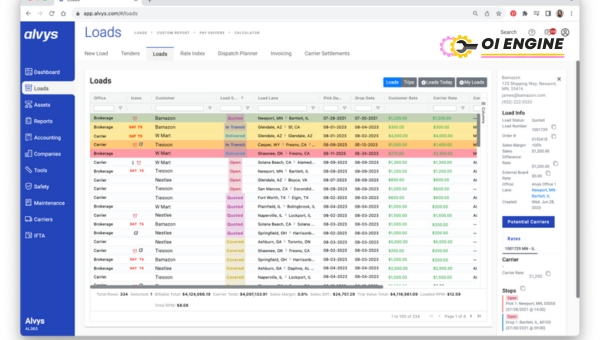
Noteworthy about Alvys is its excellent load-planning feature where users can outline multiple loads at once while ensuring maximum profitability due to the system’s optimal route suggestion feature-it certainly pays off!
Another ground-breaking feature is the accounting integration, designed to save time by avoiding dual entries and providing an up-to-date financial view of your business. What about order management? Fret not; this platform provides an exceptionally clear user interface for seamless handling of orders.
Pros:
- Superb load planning feature.
- Excellent customer service.
- Well-integrated with accounting systems.
Cons:
- Less suited for less tech-savvy users due to its extensive features.
- Some users find the interface a bit difficult to navigate.
- Pricing may also be an issue for small-scale businesses.
10. Trimble
Trimble has emerged as a strong contender in the Trucking Dispatch Software sector with its user-friendly interface and extensive feature set.
For me, it does more than just meet logistics needs; it simplifies them. If you’re looking to foster communication between drivers, dispatchers, and customers without sacrificing route planning or execution, Trimble might be for you.
This software features fleet tracking, load management capabilities, mapping tools for precise routing decisions, and PDF invoicing options for seamless payment processes among others.
Interestingly enough, it integrates well with other systems which saves time from operating multiple platforms simultaneously.
Pros
- It provides real-time visibility into fleet operations which assists in informed decision-making.
- The platform offers a wide range of functionalities under one roof making it convenient.
- Their customer service has been praised highly for timely responses and trimming downtime resulting from system issues.
Cons
- While being packed with features is fantastic; this can make the application slower to operate than desired.
- The customization options can be overwhelming to new users leading to a steep learning curve.
- Prices may run high compared to other dispatch systems available but that reflects its comprehensive offering.
Also Read: How To Start A Trucking Company: A Guide
11. Dr Dispatch
Dr Dispatch stands out due to its simplicity while not compromising on functionality at all; think of it as having your cake and eating too! Its specialty lies in small fleet management with easy-to-use load planning features ensuring optimal use of resources.
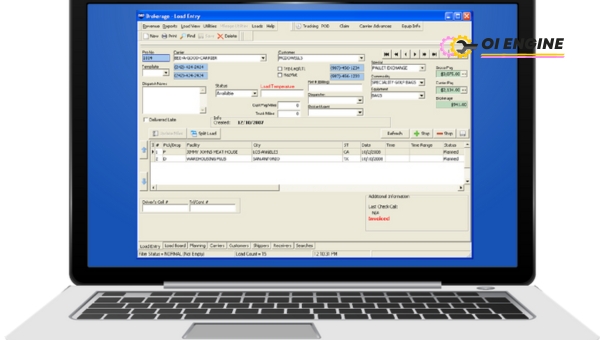
The platform also includes accounting capabilities allowing integrated bookkeeping within your logistics operations to easily generate necessary reports when needed. Moreover, it supports different modes of transportation which elongates its usability.
Pros
- Great for small to medium-sized businesses due to its simple yet effective nature.
- The accounting module is quite elaborate hence eliminating the need for secondary financial software.
- Its smooth integration into existing systems is seamless minimizing the transition downtime.
Cons
- Larger companies might find the features limited compared to other robust mega fleet managing software.
- Customer support can be a little hit-or-miss according to some user reviews; great one time, not so much on another occasion.
- Dr Dispatch doesn’t include a mobile application which can limit field accessibility for crews on the go.
12. drayOS
drayOS is a name that resonates quite powerfully when talking about top-tier Trucking Dispatch Software. Driven by cutting-edge technological features, drayOS facilitates seamless management of freight operations including dispatches and trucking assignments.
It brings together all vital components under one roof, giving users the advantage of enhanced efficiency and productivity.
The dashboard is known for its user-friendly interface that can be easily navigated even by beginners. One can oversee drivers’ schedules, job statuses, route planning, and more with just a few clicks. Additionally, it provides real-time data-capturing capabilities to keep track of ongoing tasks accurately.
Pros:
- Exceptional real-time tracking with efficient workflows
- Comprehensive dashboard featuring detailed information
- User-friendly design which makes it easier to navigate
Cons:
- Could be overwhelming for people new to dispatch software
- The introductory pricing may seem high for small businesses
- Limited customization options compared to some competitors
13. Onfleet
As we continue our exploration into the world of Trucking Dispatch Software, our next stop is Onfleet; another ace in this field known for its extensive offering in managing delivery operations effectively.
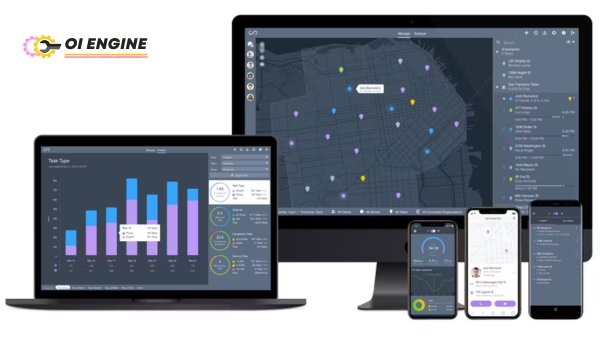
What sets Onfleet apart is its sophisticated analytics capability which allows users an insightful glimpse into key performance metrics including service time estimation accuracy rates or successful delivery percentage rate among others.
This platform provides solutions not only for dispatching but also covers assignment planning and delivery tracking making it an encompassing tool that caters to multiple needs within one robust system.
Pros:
- Powerful analytics for insights on performance metrics
- Wide range of features covering planning to tracking
- Versatile, catering to different delivery-based operations
Cons:
- The pricing structure may not suit small businesses
- Some users consider the interface a bit cluttered
- Advanced features may require a learning curve for some users
14. PCS TMS
PCS TMS is among the top players in trucking dispatch software. Seamlessly integrating all functional aspects of logistics and supply chain management, this cloud-based software is a game-changer for businesses. Automated routing and scheduling tools, greatly reduce time spent on manual planning.
One thing I appreciate about PCS TMS is its remarkable integration capability with other tools like accounting systems and operational systems without any glitches. Plus, real-time tracking keeps everyone updated about dispatch statuses at all times.
However, even great products have their drawbacks. Some users find the interface less user-friendly than competitors’. Although there might be a learning curve for beginners due to the complex features involved.
Pros:
- Comprehensive logistics management.
- Effective integration with existing tools.
- Real-time updates push efficiency forward.
Cons:
- The interface could be more intuitive.
- The learning curve for beginners may be steep.
- Some complex functionalities may seem daunting at first glance.
15. TruckLogics
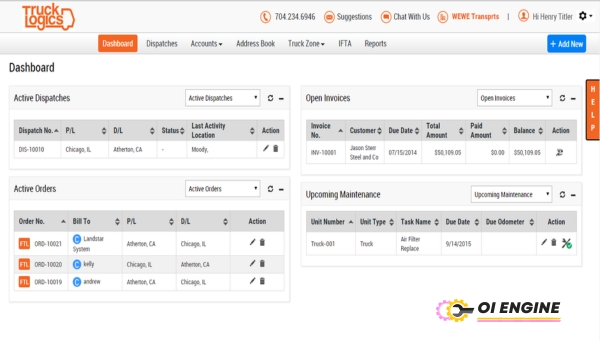
TruckLogics is another excellent cloud-based trucking dispatch software solution. On a mission to ease the management of paperwork, invoicing, and other time-consuming tasks, it has an intelligently designed dashboard offering complete business oversight at a glance!
My favorite component has to be the IFTA reporting feature! In terms of drawbacks; users often want more customization options which are limited here.
Pros:
- Cloud-based efficiency and convenience.
- Smart dashboard with complete business visibility and control.
- Modern compliance features like IFTA reporting
Cons:
- Customization options are limited for unconventional needs.
- Additional advanced features could boost its functionality range further!
- Photography quality inside software could be enhanced.
Also Read: Safeguard With Physical Damage Insurance Coverage
Analyzing Trucking Systems
As someone immersed in the complex world of trucking and logistics, it’s critical to fully understand the various systems in play.
This specific focus is given on two essential elements that contribute highly to the efficiency of a trucking business: Trucking Dispatch Software and Trucking Management Software. Although they might sound alike, the functions they perform differ significantly.
Dispatch Software Vs Trucking Management Software
- Functionality: The very fundamental difference lies in their functionalities. A Trucking Dispatch Software primarily focuses on scheduling and coordinating dispatches, thus keeping track of every single truck’s whereabouts within your fleet. On the other hand, Trucking Management Software caters to broader aspects like invoicing, customer relations management (CRM), billing details, payroll management, etc., virtually managing every aspect related to your business structure.
- Target Audience: While both types of software cater to trucking businesses primarily, their particular target base might differ slightly. ADispatch software is specifically tailored for dispatchers and drivers whereas Management software addresses an entire organization’s need – from finance staff to fleet managers.
- Interactivity: The factors of interaction also stand quite different between these two types of software. With a dispatch system, you get real-time tracking where the dispatcher can coordinate with the driver anytime during transit while management software provides detailed snapshots of your company’s performance metrics but lacks a real-time interactivity feature as its main goal is data collection and analysis rather than coordination.
- Comprehensiveness: Another significant difference would be comprehensiveness; while dispatch software is organized around one particular area –and tracks vehicle movements–trucking management solutions offer comprehensive functionality addressing a vast number of operational needs which includes but are not limited to accounting processes, repair & maintenance schedules, fuel consumption report etc.
- Price Point: Due to its broad application within various business operations, Trucking Management Software generally comes with a higher price tag than dispatch software. They are often considered as large-scale investments for any trucking business which is directly linked with multiple facets of the company.
Knowing the Common Customers
As a trucking dispatch software user, I have seen various clients from different sectors, all with diverse requirements and uses for this system.
An intriguing aspect of this software is its versatility in catering to various consumer types. It’s not only freight companies that use these programs – there are numerous customers from varying fields who find value in this technology.
Who are the customers of Trucking Dispatch Software?
In my experience, there was a diverse range of people who had different needs when it came to these systems; here are some more common ones:
- Freight Carriers: In many cases, the primary users are most likely freight carriers. Both small-scale and large-scale shippers find usefulness in trucking dispatch software because they deal with load allocation for their fleet daily.
- Brokers: These individuals act as intermediaries between shippers and carriers. For them, a broadcasting application is essential in ensuring smooth operations as they can manage multiple leads simultaneously.
- Shippers: Certain shippers use Transport Dispatch applications directly to handle their daily activities efficiently. With the help of trucking dispatch software, they can verify lead times and assess load conditions more accurately than ever before.
There’s no denying that Individual Owner Operators also significantly benefit from using Trucking Dispatch Software.
This enables them to streamline operations like fleet management or load planning based on real-time data inputs which again leads to increased business efficiency overall.
Also Read: Top 14 Truck Factoring Companies 2024
Cost Analysis
While taking a look at the costs of implementing trucking dispatch software might seem daunting at first, it’s crucial to remember that this investment can dramatically streamline operations.
Considering the wide range of functionalities offered by these software systems, it isn’t surprising that their prices can vary significantly.
How Much Does it Cost to Implement Dispatch Software?
When considering finances, keeping in mind that each company’s needs will differ and so will the associated costs is essential.
Generally speaking, you could expect to pay anywhere from $10 to $200 per month for trucking dispatch software.
In some cases, particularly large transportation companies with demanding requirements may find themselves investing thousands each month into these systems.
The price often depends on various factors including the specific features required, intensity of usage, and how many users will be accessing the system.
Not all billing structures are created equal; some software providers implement a flat fee while others base their charges on criteria such as usage or the number of users.
So you might come across one system that charges a high upfront fee with little monthly cost and another where you pay more every month but have minimal initial setup fees – different approaches serve different needs.
Delving deeper into pricing specifics reveals an impressive breadth of options when it comes to dispatching software solutions – standalone or otherwise.
Standalone dispatch software options tend to be cheaper as they offer fewer functionalities compared to comprehensive trucking management systems integrated with dispatch functions.
For instance, you might come across standalone solutions costing around $7.95 per month. On the other end of the spectrum lie comprehensive management programs – equipped with advanced features beyond simple dispatch functions such as accounting tools or fleet tracking- which may set you back anywhere from $50 up to even $200 per month.
FAQs
What is the primary software used by truck dispatch?
The primary software used by truck dispatch varies depending on the organization and their specific needs. However, some of the most commonly used ones include TruckingOffice, ITS Dispatch, ProTransport, and Alvys.
What is the best dispatching software?
There are many good options available. However, in 2025, some of the best recognized are TruckingOffice for its simplicity and Rose Rocket for its powerful functionalities.
What software is used for trucking?
Different types of software like Samsara or Trimble may be used for various aspects of trucking operations including tracking fleet movements, scheduling pick-ups and deliveries, or logging hours-of-service data.
What is TMS dispatch software?
TMS stands for Transportation Management Software. It’s a type of tool that helps coordinate all aspects of freight management including dispatch as well as load planning and optimization. An example would be PCS TMS or Route4Me.
Also Read: Find 14 Best Car Shipping Companies for Safe Delivery
Conclusion
In my search for the best trucking dispatch software of 2025, I saw many contenders. TruckingOffice, ITS Dispatch, ProTransport – indeed, all fifteen platforms discussed have something unique to offer.
Whether spreading costs via PCS TMS or scheduling with Onfleet, quality trucking dispatch software can streamline your trucking business.
Knowing your customers would help tailor an efficient system suited to their needs. Reliable software drastically reduces errors and enhances overall efficiency.
However, implementation comes at a cost that varies by the complexity involved. An investment in the best dispatch software is an investment in your business’s future success.
